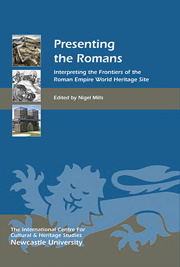Book contents
- Frontmatter
- Contents
- List of Illustrations
- Acknowledgments
- List of Abbreviations
- Preface
- Introduction: Presenting the Romans – Issues and Approaches to Interpretation
- 1 Tradition and Innovation: Creating a New Handbook to the Roman Wall
- 2 Re-enactment and Living History – Issues about Authenticity
- 3 Reconstruction Drawings: Illustrating the Evidence
- 4 Images from the Past: Fibulae as Evidence for the Architectural Appearance of Roman Fort Gates
- 5 Multimedia Interpretation Techniques for Reconstructing the Roman Past at the Limes Museum in Aalen and at the Limes in Baden-Württemberg
- 6 Vindonissa: Changing Presentations of a Roman Legionary Fortress
- 7 Bringing to Life the Ancient City of Viminacium on the Danube
- 8 An International View of Reconstruction
- 9 A Roman Museum for Vienna
- 10 Woerden – Hoochwoert (Dutch Limes): Showing the Invisible
- 11 Mainlimes Mobil: Presenting Archaeology and Museums with the Help of Smartphones
- 12 Voices from the Past: Presenting (re)Constructed Environments through Multimedia Technologies
- 13 Digital Reconstruction and the Public Interpretation of Frontiers
- 14 Information, Disinformation and Downright Lies: Portraying the Romans
- 15 Romanes eunt Domus?
- 16 The Living Frontier: the Passing of Time on Hadrian's Wall
- 17 The Hadrian's Wall Interpretation Framework: Audience Research
- 18 The Hadrian's Wall Interpretation Framework
- 19 Applying the Hadrian's Wall Interpretation Framework
- List of Contributors
- Index
- Heritage Matters
Introduction: Presenting the Romans – Issues and Approaches to Interpretation
Published online by Cambridge University Press: 05 September 2013
- Frontmatter
- Contents
- List of Illustrations
- Acknowledgments
- List of Abbreviations
- Preface
- Introduction: Presenting the Romans – Issues and Approaches to Interpretation
- 1 Tradition and Innovation: Creating a New Handbook to the Roman Wall
- 2 Re-enactment and Living History – Issues about Authenticity
- 3 Reconstruction Drawings: Illustrating the Evidence
- 4 Images from the Past: Fibulae as Evidence for the Architectural Appearance of Roman Fort Gates
- 5 Multimedia Interpretation Techniques for Reconstructing the Roman Past at the Limes Museum in Aalen and at the Limes in Baden-Württemberg
- 6 Vindonissa: Changing Presentations of a Roman Legionary Fortress
- 7 Bringing to Life the Ancient City of Viminacium on the Danube
- 8 An International View of Reconstruction
- 9 A Roman Museum for Vienna
- 10 Woerden – Hoochwoert (Dutch Limes): Showing the Invisible
- 11 Mainlimes Mobil: Presenting Archaeology and Museums with the Help of Smartphones
- 12 Voices from the Past: Presenting (re)Constructed Environments through Multimedia Technologies
- 13 Digital Reconstruction and the Public Interpretation of Frontiers
- 14 Information, Disinformation and Downright Lies: Portraying the Romans
- 15 Romanes eunt Domus?
- 16 The Living Frontier: the Passing of Time on Hadrian's Wall
- 17 The Hadrian's Wall Interpretation Framework: Audience Research
- 18 The Hadrian's Wall Interpretation Framework
- 19 Applying the Hadrian's Wall Interpretation Framework
- List of Contributors
- Index
- Heritage Matters
Summary
Purpose and Discussion
The aim of this book is to explore and address a number of perceived issues in the public presentation of the archaeology of Hadrian's Wall and of the Frontiers of the Roman Empire. It is relevant also to wider issues of public presentation of the roman world in Britain and elsewhere and to the application of principles of good interpretation to periods of the past in which archaeology is a major source of evidence. The issues can be summarised as follows:
Public presentation is generally very academic, focusing on the imparting of knowledge from academics and professionals to visitors rather than responding to the interests and questions of the visitors (and potential visitors) themselves.
Public presentation has tended to focus on the display of objects for their own sake, avoiding and excluding approaches which seek to use objects to illustrate themes and narratives.
Academic and professional archaeologists are often very conservative in their understanding of how archaeological evidence might be used for public presentation.
There is generally a poor understanding of the basic principles of good interpretation in the academic and museums world, with a perception that anything beyond straightforward presentation of objects and well-authenticated reconstruction implies ‘Disneyfication’, ‘dumbing down’ or ‘marketing’. Use of the word storytelling by interpreters tends to equate with the word fairytales in the minds of many academic and professional archaeologists and curators.
Public presentation of the Roman Frontiers has a tendency to focus on the Roman army and its military infrastructure and to avoid broader political, economic and social issues.
[…]
- Type
- Chapter
- Information
- Presenting the RomansInterpreting the Frontiers of the Roman Empire World Heritage Site, pp. 1 - 10Publisher: Boydell & BrewerPrint publication year: 2013

